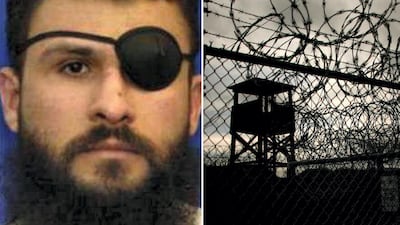A prisoner at Guantanamo Bay who was waterboarded 83 times by the CIA at a series of notorious ‘black sites’ around the world suffered a setback on Friday in his legal claim against British officials for alleged complicity in his torture.
Zayn Al-Abidin Muhammad Husayn, a Saudi-born Palestinian and suspected senior Al Qaeda lieutenant, was shuttled secretly between six countries where he was subjected to “extreme mistreatment and torture” after he was shot and detained in Pakistan in 2002, according to court papers.
His lawyers say he was one of the first people to suffer the simulated drowning technique known as waterboarding, that he was denied food and medical treatment and kept inside a box designed like a coffin before being sent back to Guantanamo Bay in 2006.
The Guantanamo inmate – better known as Abu Zubaydah – claims British intelligence agents passed questions to their counterparts to try to find out about terrorist plots being planned despite knowing that he was being tortured.
His lawyers are suing the UK Government for false imprisonment, negligence and misfeasance in public office in the British courts but a judge ruled on Friday that the case should be determined under the laws of the six countries where he was detained.
Abu Zubaydah had no links to the UK and there was no evidence that he had ever visited the country, said Mr Justice Lane.
“The applicable law for the purposes of the claimant’s claim is the law of the Six Countries,” he said.
The case will still be held at London's High Court at a future date.
Abu Zubaydah was the first person to be detained in a US ‘black site’ – a secret detention facility operating outside US territory and its legal system in the aftermath of the September 11, 2001 attacks on the United States and the invasion of Afghanistan, according to a US Senate intelligence committee report.
He was taken to Thailand following his capture before being moved to Poland and then to Guanantamo Bay in 2003. He was moved the following year because of CIA concerns that the US Supreme Court would allow detainees to challenge their detentions.
He was flown to Morocco, Lithuania and Afghanistan before he was returned to Guantanamo Bay in 2006, where he remains, according to UK court papers. He claims to have been mistreated in the six countries where he was held.
He was the first high-profile Al Qaeda suspect to be captured after the September 11 attacks and his ordeal in captivity became the blueprint for brutal US treatment, according to the US Senate intelligence report. During the waterboarding, Abu Zubaydah became "completely unresponsive, with bubbles rising through his open, full mouth", it said.
President George W. Bush claimed in 2006 that information provided by Abu Zubaydah under the CIA’s programme of “enhanced interrogation” led to the capture of Ramzi Bin Al Shibh, a Yemeni accused of being a key facilitator of the September 11 attacks.
The former president further claimed that the pair provided information that helped in the capture of 9/11 mastermind Khalid Sheikh Mohammed.
But other claims that Abu Zubaydah made while in custody have been found to be false.
British police started an investigation in 2019 into the alleged complicity of security and intelligence officials from MI5 and MI6.
The UK’s all-party parliamentary intelligence and security committee concluded in 2018 after a four-year inquiry that MI6 knew about his extreme mistreatment and possible torture.
The committee said that a senior MI6 officer had stated that “98% of US special forces” would have been broken by the same mistreatment.


